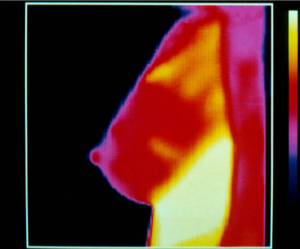
What is REALLY the truth — or hype — about how effective breast thermography is at detecting cancer?
Some claims are that thermography can detect breast cancer years before a mammograph would pick it up.
Is this too good to be true? And if it’s all a lie, how is it that thermography companies are getting away with these claims?
I decided to get a radiologist’s take on this. But to be fair, keep in mind that this article represents the doctor’s perspective.
My job here is to accurately represent Dr. Debora Fineman.
Dr. Fineman is a former diagnostic radiologist with Cancer Treatment Centers of America.
Breast Thermography Claims: Too Good to Be True?
You may have read somewhere that thermography, which does not use radiation, can detect breast cancer years before it actually develops, and that this imaging device does not require the painful compression of the breast, but instead, uses heat.
So it’s fair to wonder just how accurate these reports are and why thermography isn’t a standard screening tool for the detection of breast cancer.
Here is how Dr. Fineman responded to my questions:
I’ll refer you to a position paper from the American College of Radiology, which is the main board determining policies and procedures for radiology including mammography.
The appropriateness criteria from 2012 states, “There is insufficient evidence to support the use of other imaging modalities such as thermography for breast cancer screening.”
The American Cancer Society position on thermography quotes a 2012 research review that found that “Thermography was able to detect only a quarter of the breast cancers found by mammography.
In other words it failed to detect three out of four cancers that were known to be present in the breast. Digital infrared thermal imaging, which some people believe is a newer and better type of thermography, has the same failure rate. This is why thermography should not be used as a substitute for mammograms.”
When I type into the search engine, “Can thermography detect breast cancer that a mammogram misses?” the results indicate that there has been no research on this; that there’s no data.



























